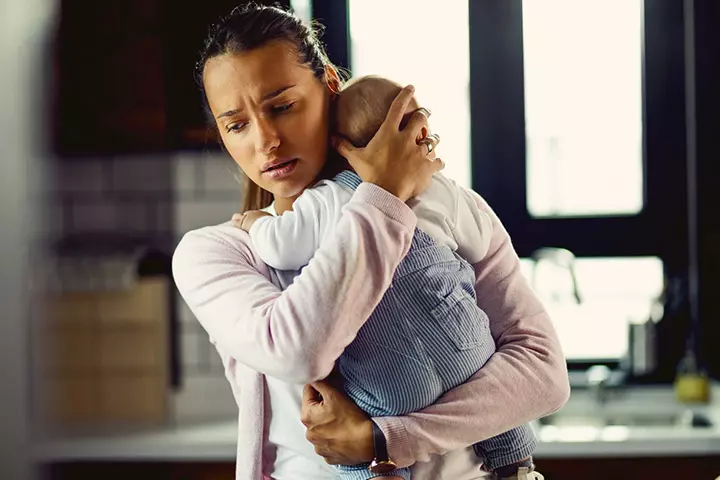
Image: Shutterstock
The arrival of the little one can result in a jumble of emotions for the new parents. No matter how much you prepare yourself for the birth of your baby, it could be an overwhelming experience nonetheless. From joy and excitement to fear and anxiety, it’s normal for new parents to experience a range of emotions. But it’s when these emotions take a toll on our mental health that they need to be addressed. Being aware of common emotional problems from baby blues to postpartum depression can help parents realize the issue early on and seek prompt treatment.
Baby Blues
Baby blues can be defined as feeling sad or moody after the first few days of your baby’s birth. It is a common condition that affects about 4 in 5 new mothers. Also known as postpartum blues, baby blues usually doesn’t require any treatment as it doesn’t last more than 2 weeks. If the feelings persist for more than 2 weeks, make sure you inform your healthcare provider (1).
Signs:
You may have baby blues if you are:
- Feeling moody or cranky
- Feeling sad
- Crying a lot
- Having trouble sleeping
- Having loss of appetite
- Finding it difficult to make decisions
- Feeling overwhelmed
What to do:
Though baby blues usually doesn’t require any treatment, there are a few things you can do that might help you feel better:
- Don’t be reluctant to accept help from friends and family. Take them up on the offer and tell them how they can be of help.
- Though you can’t get a restful night’s sleep, try to take quick power naps whenever you can.
- The responsibilities of taking care of a baby can be overwhelming for new parents. Ask someone else to watch your baby for a while so you can take a break.
- Find a support group for new moms and connect with other moms. This can help you realize that you are not alone.
Image: Shutterstock
Anxiety
Anxiety is normal both during and after pregnancy. But too much anxiety can make it hard for you to cope with the pregnancy or your baby.
Anxiety experienced during pregnancy is known as antenatal anxiety, and anxiety after giving birth is known as postnatal anxiety (2).
Postnatal anxiety can be stressful for new parents and can occur without reason. It affects about 1 in 7 new moms and can occur anytime between the first year after giving birth.
Signs:
You may have postnatal anxiety if you have the following symptoms (3):
- Feeling irritable or restless
- Panic attacks
- Trouble falling asleep
- Taken over by feelings of anxiety and worry
- Having heart palpitations, tense muscles, or racing heart
- Fear that something bad may happen to your baby
- Constantly checking on your baby
What to do:
If you experience any of the above signs, make sure you take the necessary steps:
- Talk to a doctor, child health care nurse, or midwife.
- You could also seek help from a counselor, psychologist, or psychiatrist.
- Try to be as open and honest as you can.
Postpartum Depression
It’s normal for new parents to feel frustrated, sad, anxious, and overwhelmed in the days following the baby’s birth. This condition is known as baby blues and usually gets better with time. But when such feelings don’t go away or become stronger than before, it could be postpartum depression (4).
Postpartum depression makes it hard for a mom to take care of her baby.
Signs:
You may have postpartum depression if you are:
- Sleeping too little or too much
- Unable to concentrate
- Feeling hopeless, sad, or overwhelmed
- No feelings of attachment towards the baby
- Eating too little or too much
- Feeling moody
- Anger
- Loss of interest in things that usually excites you
- Feeling disconnected from friends and family
- Blaming oneself unnecessarily
What to do:
Postpartum depression can be caused by a normal of factors such as hormonal changes, lack of sleep, and increased stress of taking care of a newborn. It can affect anyone, but women who have had any kind of depression in the past may be more at risk. If you have any of the above signs, then:
- Make sure you get help right away; the sooner, the better.
- Talk to your healthcare provider, a psychologist, or a psychiatrist.
- If you are recommended medications, let your doctor know if you are breastfeeding your baby or not.
- Focus on self-care by getting enough rest and eating well.
Postpartum Psychosis
Unlike the other emotional problems experienced by new parents after their baby’s birth, postpartum psychosis is much more rare. It is a serious mental health illness that needs to be treated with urgency (5) (6).
Postpartum psychosis affects 1 in every 1000 moms. Women with a family history of schizophrenia or bipolar mood disorders are more at risk of developing this condition.
Women diagnosed with this condition may be a risk to themselves, their baby, or both.
Signs:
Postpartum psychosis is usually confused with postpartum depression. Symptoms generally appear within a month of giving birth and include the following:
- Restlessness
- Feeling confused
- Hallucinations
- Delusions
- Feeling fearful or suspicious
- Loss of appetite
- Low mood
- Trouble sleeping
- Erratic behavior
- Excessive euphoria
What to do:
If you have postpartum psychosis, you may not be aware of it. Your partner, friend, or close relative should be able to recognize the signs so that treatment can be provided right away. If the treatment is delayed, the condition may get worse, making it hard to treat. If you or someone you know shows the above signs, ensure that they get the right help.
- Talk to a doctor, counselor, psychologist, or psychiatrist.
- If you have a family history of bipolar disorder or schizophrenia, make sure you share this information with your doctor during the initial check-ups.
- If you had a traumatic birth or pregnancy experience, discuss it with your doctor.
Parents, especially mothers, need all the support they can get during the first year after their baby’s birth. Remember that it’s normal to feel overwhelmed and a bit moody with all the responsibilities and challenges that come with being a new parent. But if you experience any of the above signs that could indicate a particular emotional problem besides baby blues, make sure you contact your healthcare provider right away, as prompt treatment is key in dealing with such issues.
Did you find our article informative? If yes, share the post with fellow moms and friends to create awareness of the common emotional problems faced by new parents.
















